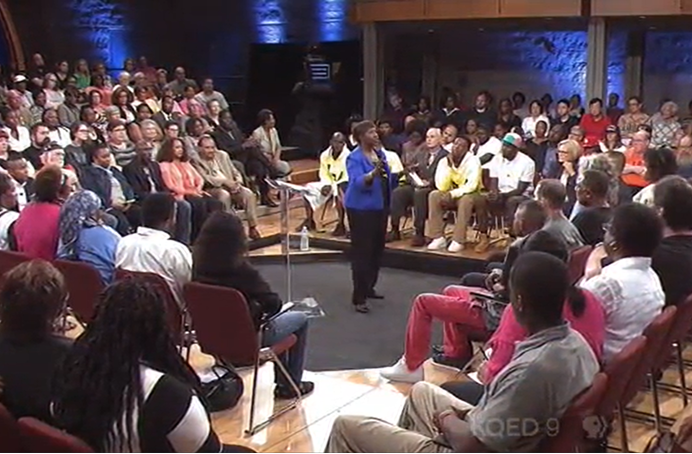After the Fire: NewsHour Coverage of Civil Unrest in America, 1991-2021
Ferguson
In 2014, after the death of Michael Brown, an unarmed 18-year-old Black teenager shot by Officer Darren Wilson in Ferguson, Missouri, protests spread throughout the city as the community expressed outrage over his death and police handling of the incident. These protests brought national attention to the Black Lives Matter movement, which had originated in 2013 following the acquittal of George Zimmerman for shooting and killing Trayvon Martin, an unarmed 17-year-old African American. To explore this period of unrest, the NewsHour did a number of stories on police brutality, race, and the community’s reactions to Michael Brown’s death. NewsHour co-anchor Judy Woodruff spoke with Jim Salter of the Associated Press in St. Louis and with USA Today’s Yamiche Alcindor, who reported from Ferguson on the first nights of the unrest, the community reactions to the incoming National Guard, and the continuation of the unrest on the anniversary of Brown’s death. Capturing the perspectives of Ferguson residents, correspondent Hari Sreenivasan interviewed members of the community, illustrating the division in the city over the unrest and the police. Ahyria Butler justified her participation in the protests, stating, “It bothers me, you known, that the police feel like they can do whatever they want because that’s not true. Because they’re here to protect us, not kill us, not harm us. If you’re gonna wear that badge, wear that badge privately, don’t wear it like it’s the ‘I can do what I want and get away with it’ badge. That’s not it.” Cheryl Frager, on the other hand, denounced the unrest, commenting, “The police in our district are being portrayed as the bad guys right now, and that needs to stop. I support the police, I support our community, and I support justice. Rioting and justice cannot go hand-in-hand. We have to have peace, and police have to go home to their families and be able to protect and serve everybody, not just one race.”
To address this divide, NewsHour co-anchor Gwen Ifill hosted a PBS Town Hall meeting in Ferguson to moderate a discussion “on what the conflict there revealed about the town, the region, and the nation… [giving] people who see events differently a chance to talk to each other, rather than at each other.” This excerpt features an exchange between Phillip Agnew, founder of Dream Defenders, a group formed after the death of Trayvon Martin that advocates the abolition of police and prisons, and Ross Kaminsky, writer for American Spectator, on systemic racism in America. The rest of the town hall meeting, called America after Ferguson, can be streamed on the PBS website.
Back in the studio, the NewsHour’s focus shifted towards policing. Guests reflected on major issues with law enforcement in America, such as the use of deadly force, police demographics, community policing, and the growing militarization of the police. Guests also examined racism in the criminal justice system in conversations about race and justice and potential solutions to these concerns.
 |
